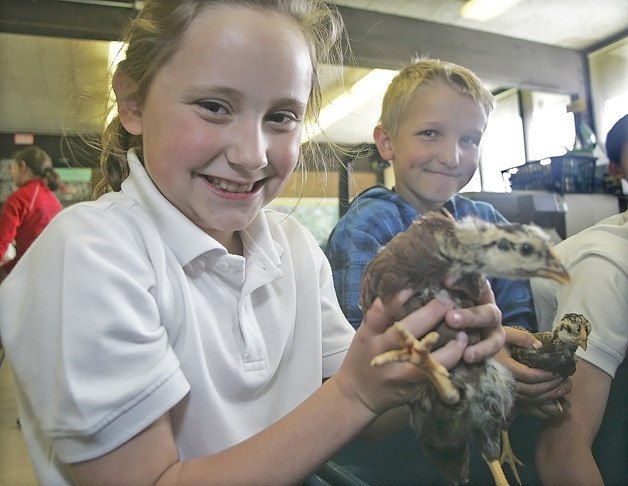When Lindsay Carter was a little girl growing up in Auburn, she discovered and carefully raised a couple of chickens from her parents’ guest room.
It left a lasting impression.
“Being a city girl, you don’t get those opportunities very often,” Carter said. “It was an experience I wanted to bring to my students.”
So Carter brought a little of the farm to her fourth-graders at Holy Family School, part of a life-cycle science project. Students watched in wonder as seven Wyandotte chickens – a docile, show breed kept for its brown eggs – struggled to shed their own hatched shells from the confines of a warm incubator in April. They observed, studied and chronicled their growth and adaptation in subsequent weeks before the chickens officially left the classroom’s enclosed pen last week.
“They were getting too big,” Carter said.
Parents also got the chance to check in on the chickens’ progress on student websites.
Four of the sprouting chickens went to fourth-grader Audrey Riley, whose family won a fundraising raffle. The chickens are destined for her grandparents’ back yard.
The other three chickens went to sixth-grade teacher Rebecca Nickel, who purchased the eggs from an Oregon breeder.
Raising chickens and understanding their nature brought out the best in the fascinated students.
“They learned a lot about caring for animals and a lot about the chicken’s behavior that they didn’t know before,” Carter said.
The kids discovered a pecking order.
“If they stay in the pen too long, they can get a little pushy,” Riley said. “It’s been fun to see them grow.”
Aidan Steele added: “It was pretty neat. They were so small when they hatched, and look at them now. They are so big.”
Carter would not allow her students to name the chickens for fear they would grow attached to them. But one fluffy chicken, with a different shade of color and a please-hold-me disposition, was affectionately named Cocoa.
“He was the first to hatch,” said Luke Stone, “and it took him a long time.”
This is the third straight year Carter has brought a hands-on animal study to her students. Last year her class successfully raised nine Louisiana mallards. The ducks were released on property Carter’s grandparents owned on Orcas Island.
Carter’s class raised cumbersome quail two years ago. Of the 13, two survived. “It was a great lesson for them in how to handle death,” Carter said.
But the latest graduating class of chickens proved to be a positive, worthwhile project. Carter is looking to raise a different breed of chickens next year.
For the students, the chickens found a home, even though it was temporary.
“When we took our state tests, they were chirping and chirping,” said Nicholas Feighner. “I felt like they were part of the class.”


